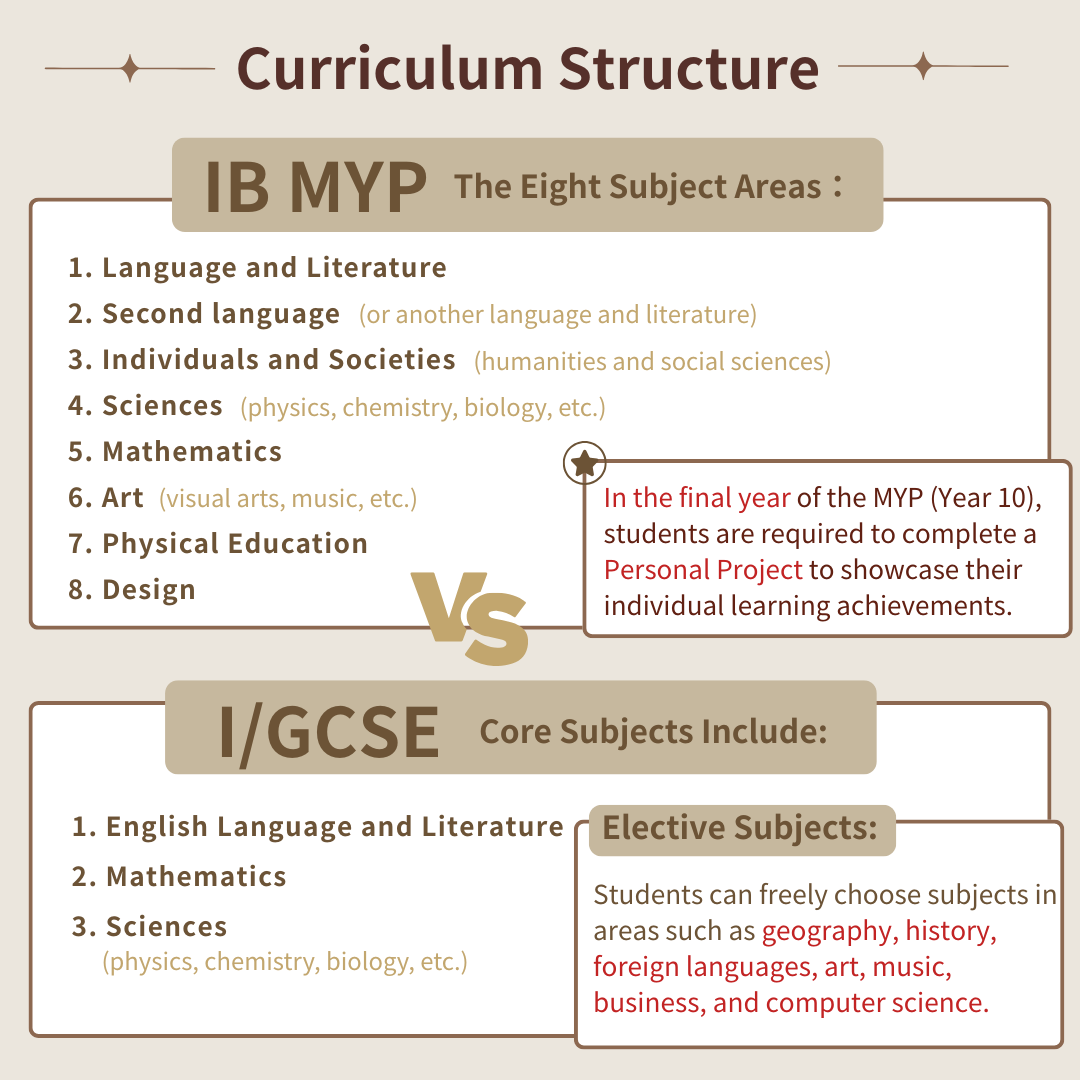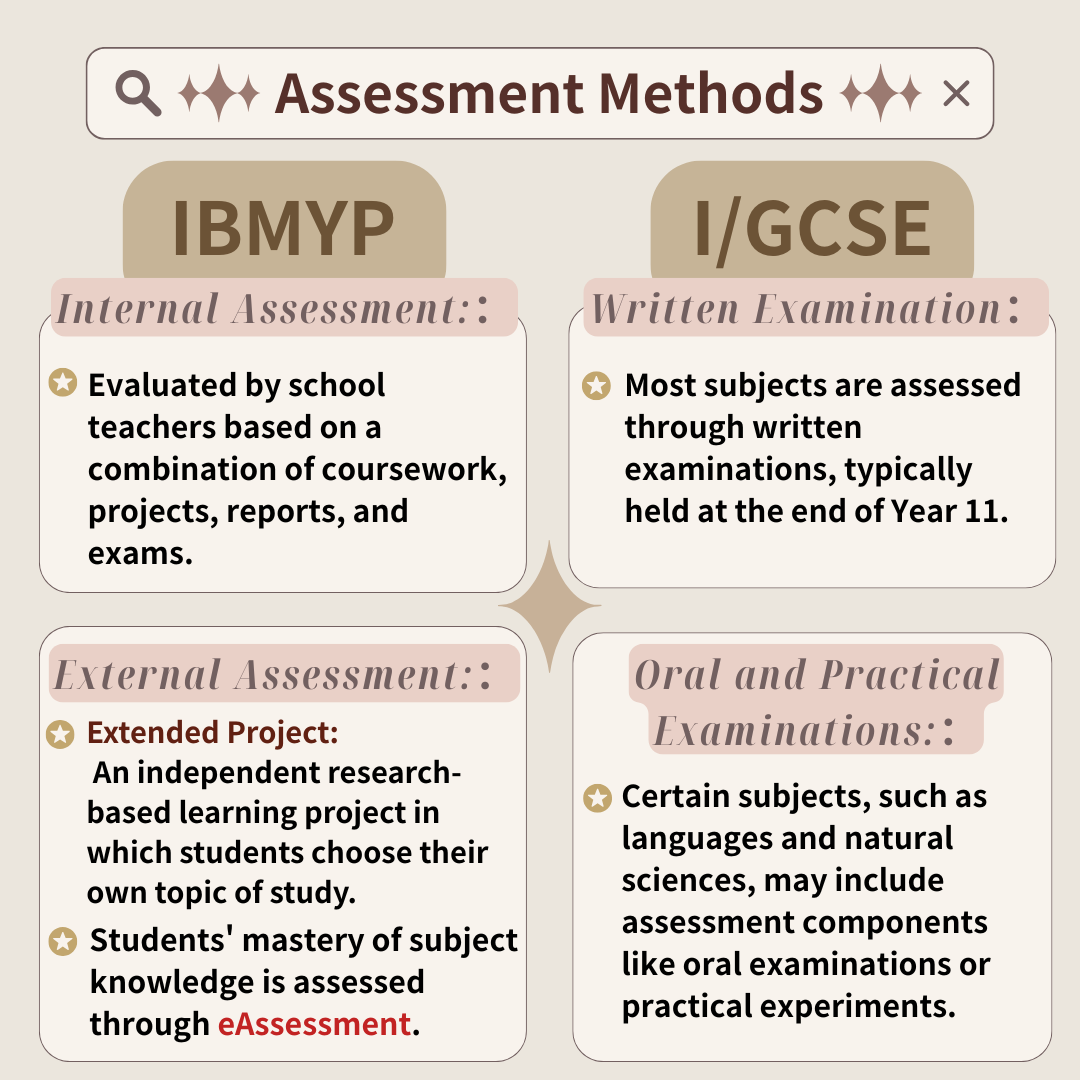IBMYP vs I/GCSE: The Full Comparison Guide
Check out our article!
- In-depth Understanding of IB MYP: Creating Global Perspective Opportunities for Children
- A Guide to the UK’s GCSE System: Courses and Planning Tips
Valour has compiled the ultimate comparison of the two education systems for you! From educational goals and teaching methods to curriculum structure and international recognition everything you need to know is right here! ✨
Educational Goals
The core goal of the IB MYP (International Baccalaureate Middle Years Programme) is to develop students holistically, ensuring balanced growth across multiple areas. This programme places special emphasis on critical thinking and reflective skills, encouraging students to actively explore, question, and reflect within academic subjects and everyday life.
Additionally, the IB MYP fosters an international mindset by not only requiring students to learn a second language but also encouraging them to understand and respect diverse cultures. It connects the knowledge learned to global issues and promotes applying this knowledge in real world contexts.
The IB MYP also encourages students to make interdisciplinary connections, integrating knowledge from various fields to build comprehensive understanding and problem solving skills. Furthermore, it emphasizes student autonomy and self management, allowing learners to independently choose, design, and research personal projects and community initiatives.
Most importantly, the IB MYP focuses on whole person development, highlighting moral education, community service, and sustainability, with the aim of nurturing well rounded global citizens.
In contrast, the GCSE (General Certificate of Secondary Education) aims to provide students with in depth knowledge in specific subjects and develop exam skills. This programme focuses on delivering specialized subject knowledge, allowing students to choose different combinations of subjects based on their interests and future career plans.
GCSE emphasizes exam techniques, including written and oral assessments, to evaluate students’ mastery and application of each subject. Besides the compulsory core subjects, GCSE offers a wide range of elective courses, enabling students to tailor their studies according to their interests and career goals. These course options are designed to help students explore and establish their future career paths.
Teaching Method
In terms of teaching methodology, the IB Middle Years Programme (IBMYP) adopts an inquiry based learning model. This approach encourages students to ask questions proactively and explore independently, fostering deep understanding and the development of critical thinking skills. In this model, teachers act as facilitators, guiding students in formulating their own inquiry questions and seeking answers.
The IBMYP also places strong emphasis on collaborative learning, which not only cultivates students’ teamwork abilities but also enhances their leadership and cooperation skills within group settings. Furthermore, students are encouraged to participate in various community service projects, integrating subject knowledge with real-world applications. This helps them understand the value and relevance of what they learn in everyday life.
Compared to the IBMYP, the GCSE adopts a more traditional teaching approach, primarily relying on direct instruction. Teachers deliver content through explanation and demonstration to help students grasp specific knowledge points and exam techniques. This method emphasizes systematic and standardized teaching, ensuring that students achieve a certain level of subject knowledge and exam readiness.
The GCSE curriculum also incorporates regular mock exams, which familiarize students with exam formats and conditions, thereby enhancing their test taking confidence and preparedness. For students who require additional support, teachers provide individual guidance to help them keep up with the course and meet their academic goals.
Curriculum Structure
The IBMYP curriculum is designed around eight key subject areas to ensure that students acquire a broad and balanced body of knowledge.
-
Language and Literature: Enhances students’ language proficiency and literary appreciation.
-
Language Acquisition: Promotes linguistic diversity and intercultural understanding through the study of a second language.
-
Individuals and Societies: Includes subjects such as history and geography, fostering social awareness and humanistic values.
-
Sciences: Covers disciplines like physics, chemistry, and biology, developing students’ scientific inquiry and reasoning skills.
-
Mathematics: Builds mathematical thinking and problem solving abilities.
-
Arts: Encompasses visual arts and music, inspiring creativity and aesthetic appreciation.
-
Physical and Health Education: Emphasizes physical well being, teamwork, and personal development.
In the final year of the IBMYP, which is Grade 10, students are required to complete a Personal Project. This is a culminating academic experience that allows students to independently choose a topic, design and conduct research, and showcase their learning and skills through a comprehensive product or outcome.
The structure of the GCSE curriculum is divided into two main parts: core subjects and elective subjects.
-
Core Subjects:
-
English Language and Literature: Develops students’ language proficiency and literary appreciation.
-
Mathematics: Enhances mathematical understanding and problem-solving skills.
-
Science: Includes physics, chemistry, and biology, aiming to build a well rounded foundation in scientific literacy.
-
-
Elective Subjects:
Students can choose from a variety of subjects such as geography, history, foreign languages, art, music, business studies, and computer science. These electives allow students to tailor their studies according to their personal interests and future career plans, providing a more diverse and personalized learning experience.

Assessment Methods
The IBMYP uses a combination of internal and external assessments to evaluate students’ overall academic performance.
- (School based assessment)
School-based teachers assess students through assignments, projects, reports, and exams. This form of assessment emphasizes students’ daily performance and overall competencies.
The following are the two main forms of internal assessment:
- (Formative assessment)
-
Purpose: To provide ongoing feedback for both teachers and students during the learning process, helping to identify students’ difficulties and adjust teaching strategies accordingly.
-
Impact: Since formative assessments are not included in the calculation of final grades, they have minimal impact on academic performance.
-
Frequency: Depends on the teacher’s preference; they may occur daily or weekly.
-
Format: Mostly informal and varied in nature, including quizzes, reports, class discussions, observations, and assignments.
-
- (Summative assessment)
-
Purpose: To evaluate and summarize students’ learning outcomes and overall achievement.
-
Impact: Usually has a decisive impact on the final grade for the term or course.
-
Frequency: Typically conducted at the end of a learning cycle or unit.
-
Format: More structured and standardized compared to formative assessment, often taking the form of formal exams, projects, or essays.
-
- (External assessment):
- (Personal Project):
ln the final year of the MYP, each student is required to independently complete a Personal Project, which is externally assessed by the IB organization. This project serves as a summative assessment and expects students to produce a creative work within a set timeframe, demonstrating their ability to work independently.
Students have the freedom to choose their own project topic, often exploring areas of personal interest and dedicating time to research. The Personal Project not only provides an opportunity for integrated learning and showcases students’ critical thinking and research skills, but also guides them in developing life skills beyond the curriculum. It helps build confidence and a sense of responsibility, fostering the qualities of lifelong learners.
- (eAssessment):
The MYP was originally designed to prepare students for the academic demands of the IB Diploma Programme (IBDP) in high school, and therefore did not include public formal examinations. However, in recent years, parents have expressed concerns that the absence of public exam results might affect their children’s opportunities for further education or school transfers.
In response, the International Baccalaureate Organization introduced the MYP eAssessment in 2016, providing students with an opportunity to obtain an internationally recognized qualification.
Schools can register with the IB to participate in the external assessment. If students successfully pass the assessments, they will be awarded a formal, internationally recognized certificate.
The assessment methods for GCSE primarily rely on written examinations, complemented by other forms of evaluation depending on the specific subject:
Written Examinations:
Most subjects are assessed through written exams, which usually take place at the end of Year 11. These exams serve as the primary method to evaluate students’ subject knowledge and exam skills.
Oral Exams and Practical Assessments:
For certain subjects, such as languages and the natural sciences, assessments also include oral exams or practical components. These forms of evaluation better reflect students’ hands-on abilities and their application of knowledge.

Academic Recognition and International Status
The IBMYP enjoys a high level of global recognition and is implemented in IB schools worldwide. It is closely connected with the IB Diploma Programme (IBDP), facilitating a seamless transition for students. This international recognition allows IBMYP students to transfer more easily between IB schools around the world and provides them with a competitive advantage when applying to universities. Many prestigious universities and educational institutions globally acknowledge the academic value of the IBMYP, offering students broad opportunities for international development.
In contrast, the GCSE is primarily popular within the United Kingdom and serves as a crucial foundation for progression to A Levels or other UK university preparatory courses. It represents an important step for British students in pursuing academic and career success. The in depth, specialized learning approach of the GCSE demonstrates students’ individual abilities. Consequently, most GCSE students continue their education within the UK or pursue higher educational qualifications in Commonwealth countries.
Teachers and Resources
Teachers of the IBMYP are required to undergo official training provided by the IB organization to fully grasp the IB educational philosophy and teaching methodologies. This training includes participating in IB workshops and related activities, ensuring that teachers can effectively apply IB teaching strategies and assessment methods. The IBMYP is guided by the IB organization, allowing schools and teachers to tailor specific teaching content based on this guidance, thereby ensuring consistency in teaching quality and standards.
GCSE teachers are required to strictly adhere to the curriculum standards and possess specific subject teaching experience. They typically have strong professional knowledge and extensive teaching experience, enabling them to teach according to the standardized materials provided by examination boards such as AQA and Edexcel. Schools have the flexibility to choose curricula and assessment standards from different exam boards, allowing them to tailor the course offerings to meet students’ needs and educational goals.

